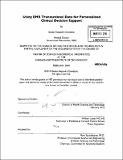Using EMR transactional data for personalize clinical decision support
Author(s)
Davidzon, Guido Alejandro
DownloadFull printable version (21.02Mb)
Alternative title
Using electronic medical record transactional data for personalized clinical decision support
Other Contributors
Harvard University--MIT Division of Health Sciences and Technology.
Advisor
William Lester.
Terms of use
Metadata
Show full item recordAbstract
Collective intelligence techniques have been used to predict stock prices, customer purchasing habits, movies and books preferences for years, yet they remain unused in the medical profession. With the increasing adoption of electronic medical records, patients' medical data has grown exponentially and thus constitutes an untapped field where similar techniques could be applied. If data were collectively farmed and intelligently filtered, patient information could be added to traditional clinical decision support tools to arrive at personalized recommendations based on empiric evidence. The aim of this work is to use the collective, de facto, clinical experience to augment clinical guidelines thereby providing physicians with personalized clinical decision support. The pharmacological treatment of hypertension was chosen as the clinical domain in which to explore the feasibility of this approach. Twelve-thousand-three-hundred-forty-seven hypertensive patients were seen at the Internal Medical Associates (IMA) clinic at Massachusetts General Hospital (MGH) between July 2004 and September 2009. Their relevant clinical and demographic variables, drug regimens and blood pressure measurements were collected from the clinic's electronic medical record system and a dataset was generated. Back-end application software that draws upon case-based reasoning (CBR) was constructed and used to compute similarity between an index patient and existing hypertension patients. (cont.) This program returned information regarding blood pressure control status and successful drug regimens used by similar patients. The use of EMR transactional data to provide a collective experience decision support (CEDSS) at the point-of-care using a computerized CBR approach is both technically possible and promising. Further studies are needed to evaluate the effectiveness of this method.
Description
Thesis (S.M.)--Harvard-MIT Division of Health Sciences and Technology, 2010. Cataloged from PDF version of thesis. Includes bibliographical references (p. 41-44).
Date issued
2010Department
Harvard University--MIT Division of Health Sciences and TechnologyPublisher
Massachusetts Institute of Technology
Keywords
Harvard University--MIT Division of Health Sciences and Technology.